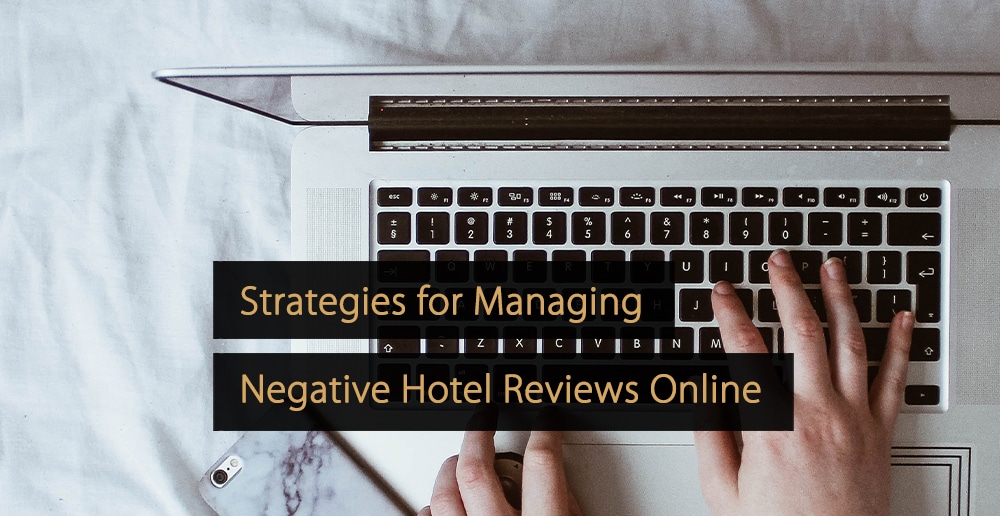While revenue management relates more to selling your product to the right person at the right time through the best distribution channels, online reviews are a rudimentary but equally important link that can’t be ignored. A handful of poor reviews can have massive implications on your business, leading potential guests to look elsewhere for accommodation. A visible selection of positive reviews, on the other hand, gives your business an unmistakable hallmark of quality. When managing online reviews, just a few solid tactics can dramatically sharpen your strategy.
Table of Contents:
- What Are Hotel Reviews?
- Why Are Hotel Reviews Important?
- 9 Tips to Manage Online Hotel Reviews
- 1. Ensure Your Guests Enjoy the Best Possible Stay
- 2. Identify Common Problems and Complaints
- 3. Make Sure You’re Replying to Hotel Reviews Online
- 4. Encourage Guests to Leave You Reviews Online
- 5. Look After Your Listings Pages
- 6. Drop the Formality and Speak to Your Guests Like Real People
- 7. Don’t Be Afraid to Admit to Your Mistakes
- 8. Keep Reviews Visible And at the Forefront of Your Website
- 9. Streamline a Review And Reputation Management Strategy
- Hotel Reputation Management Software to Manage Online Reviews
What Are Hotel Reviews?
Hotel reviews are assessments or critical appraisals of hotel guests provided after a stay. They can take different forms, such as written or video reviews, and are published across various channels, including social media, online travel agencies, other booking websites, and dedicated review platforms.
In a hotel review, a guest may evaluate the quality of the hotel’s rooms, facilities, location, and staff. Reviews primarily serve as a means of providing feedback to a hotel, whether positive or negative. They may also function as a form of recommendation for other guests or as a means of instituting change if a hotel falls short in certain areas. According to the Online Reviews Statistics Report by Review Trackers, 94% of consumers change their minds about businesses from a negative review.
Why Are Hotel Reviews Important?
It is difficult to overstate the importance of hotel reviews in the modern hospitality industry. They provide valuable feedback on what hotels are doing right and wrong and can help to draw attention to areas where improvement is needed. However, on top of this, they are also crucial to business success.
A large number of guests now actively seek out reviews before booking a hotel room. If hotels provide clean rooms, great service, nice food, and excellent facilities, they will attract positive reviews, encouraging other customers to book. The quality of reviews often goes hand-in-hand with a hotel’s wider reputation. Attracting many positive reviews can boost visibility and prestige, while negative reviews can easily dissuade customers from booking.
Table: Benefits of Hotel Reviews
9 Tips to Manage Online Hotel Reviews
Below are nine tips to manage your online hotel reviews for optimal results.
1. Ensure Your Guests Enjoy the Best Possible Stay
Ensuring your guests have the best time possible is paramount when building and maintaining a solid reputation in the hotel and hospitality industry. If your guests leave your hotel in a good mood, chances are they’ll leave you a glowing review. Ensure you instill a philosophy of striving to go that extra hurdle, especially when it comes to members of staff who directly communicate with guests during their stay. Your team needs to be approachable and communicative. If a guest looks unhappy or despondent, a good team member will show initiative and solve a problem before it becomes a damaging anecdote. Likewise, when a guest requests support, your staff must deliver a fix quickly, setting the bar high for customer satisfaction.
2. Identify Common Problems and Complaints
Keeping an eye on your online reviews can prove time-consuming, but it’s crucial to dedicate this time until you’ve ironed out any problems and feel confident you’re acting on everything you need to. Online reviews don’t just help bolster your reputation to prospective guests; they can also be used to identify recurring issues that guests aren’t happy about. Look for patterns in feedback and isolate the most commonly complained about issues. This will help you identify weak links in service, whether that’s a shortcoming of your facilities or a lack of performance with your team. If complaints suggest your team needs work, don’t be afraid of bringing these queries directly to your workforce.
3. Make Sure You’re Replying to Hotel Reviews Online
One of the biggest things you can do to manage your online reputation is to respond to what’s being said about you online. If a previous guest leaves a bad review, don’t just let this sit and leave it unattended. It’s all about damage limitation, so show you’re a hotel that listens to your guests and responds to them to let them know that you’ve taken their feedback on board and, secondly, that you’ll go above and beyond to rectify any issues. If you think a review has been left unfairly, don’t be afraid to challenge this, although remain as neutral and professional as possible.
Likewise, if you feel that a review has been left by someone who hasn’t stayed at your hotel, or you suspect a touch of espionage from a competitor, consider getting in touch with the web manager of the review site to have the feedback removed. If you’ve been left a particularly positive review, don’t neglect a reply here, either. Even if guests are overjoyed with the service they’ve been treated to, they’ve still gone out of their way to leave you a good review. Show them the same courtesy and take a moment or two to thank them. According to the Online Reputation Statistics Report by Status Labs, 90% of consumers are likely to frequent a business if all of their reviews are replied to.
Video: How To Respond To Reviews?
4. Encourage Guests to Leave You Reviews Online
Not every guest will trawl through endless reviews before deciding whether to stay with you, but maintaining a high number of reviews is important. Not only will this demonstrate a high volume of previous guests, but it also negates the impact of the occasional bad review. An important strategy within review management is encouraging guests to leave reviews online, whether with a friendly mention as they check out or a follow-up email once they’ve returned home or ventured off to their next port of call. Be careful offering incentives to guests for writing a review. This can come across as buying good feedback and can do your reputation more harm than good.
5. Look After Your Listings Pages
Many review websites allow hotels to manage their own listing pages, and where this is the case, it is important that you continually manage them. Always keep contact information up to date, upload photographs, and try to keep adding more images over time so that people do not see rooms from years past. Taking the time to manage listing pages can make your hotel seem more professional and on the ball.
6. Drop the Formality and Speak to Your Guests Like Real People
If you’re utilizing social media and similar channels to communicate with guests, be careful not to sound too corporate and mechanical. Ensure you’re talking to customers as you would if they were before you. You’ll yield a better response from it, and guests will feel they’ve been treated to the personal touch. A potential customer would rather feel like they’re staying somewhere that treats the guest as an individual. You’ll sound too corporate and one-size-fits-all if you rigidly word your communications.
7. Don’t Be Afraid to Admit to Your Mistakes
It’s not the end of the world if a guest leaves you a bad review. Rather than panic at the sight of a one or two-star review, consider how you can build upon your mistakes and prevent yourself from ever falling foul of a poor review again. Respond to bad reviews as they arise, and make sure you affirm that you’re doing everything within your power to ensure the same issues don’t arise again. At the same time, make sure you are making an effort to rectify these problems. The worst thing you could do is profess to change your ways, only for a disappointed guest to return and experience the same issues a second time. Their next review won’t merely be negative feedback about their service, but an angry response to feeling lied to and duped.
8. Keep Reviews Visible And at the Forefront of Your Website
Potential guests trust the opinions of fellow travelers, so make sure your reviews aren’t hard to find. A customer can always consult a third-party agency to check your reviews, but there’s no better showcase of the best feedback than your website. Keep your reviews at the forefront of your website with unavoidable displays to constantly remind guests of positive stays by previous guests.
9. Streamline a Review And Reputation Management Strategy
Once you’re dealing with a high volume of guests, you’ll need to introduce a reliable way to manage reviews online. Dedicating a staff member to this can be one way of handling the job, but this can be costly and inefficient. Instead, consider monitoring tools to help manage reviews and trigger alerts to newly added write-ups so you can respond and react to reviews promptly.
Hotel Reputation Management Software to Manage Online Reviews
Modern travelers value the opinions of previous hotel guests and tend to make booking decisions based on their reputation. For this reason, online reviews can determine how successful your hotel will be at attracting guests and generating revenue, and you need to take proactive steps to manage this.
In the article “Hotel Reputation Management Software: All You Need to Know!” you will learn about the value of modern software solutions that allow you to manage reviews and online feedback from a single location.
How to Manage Hotel Reviews FAQs
When it comes to managing your online reviews and reputation, don’t cut corners. A little effort goes a long way, giving your business an extra boost that online marketing alone can’t. Moreover, it’s a cumulative process, becoming more efficient and cost-effective as time passes.
Did You Like This Article About Hotel Reviews?
You might also be interested in the following articles:
- The Latest Hotel Marketing Trends in the Hotel Industry
- Essential Hotel Marketing Strategies
- The Most Important Online Distribution Channels for Hotels
- Ways Personalisation Marketing Can Benefit the Hospitality Industry
- Hotel Advertisement; Effective Hotel Advertising Strategies
- Hotel App: Optimise Your Guest Communication & Experience
More Tips to Grow Your Business
Revfine.com is the leading knowledge platform for the hospitality and travel industry. Professionals use our insights, strategies, and actionable tips to get inspired, optimize revenue, innovate processes, and improve customer experience.Explore expert advice on management, marketing, revenue management, operations, software, and technology in our dedicated Hotel, Hospitality, and Travel & Tourism categories.
This article is written by:
Hi, I am Martijn Barten, founder of Revfine.com. With 20 years of experience in the hospitality industry, I specialize in optimizing revenue by combining revenue management with marketing strategies. I have successfully developed, implemented, and managed revenue management and marketing strategies for individual properties and multi-property portfolios.










You did an excellent job! Thank you for sharing this useful information about how to manage online reviews; I look forward to hearing about other hotel-related topics in the future.
Your blog is very nice. The information about hotel reviews is very helpful :-)
Fantastic post with good tips. very helpful. Thanks for sharing.
Thank you so much for posting such an informative and helpful post about how to manage online hotel reviews. It really helped. Thanks again.